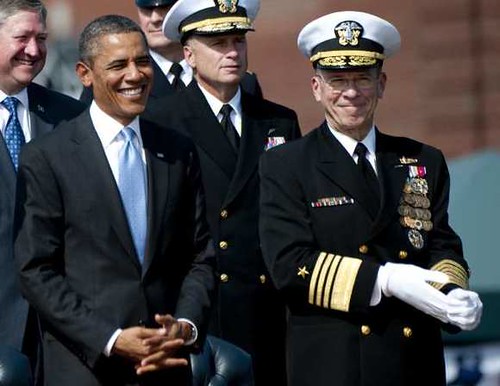
Obama has continued the US imperialist militarism throughout the world. His administration has escalated the war in Central Asia and sent the CIA and AFRICOM into Libya and other regions of Africa., a photo by Pan-African News Wire File Photos on Flickr.
March 30, 2012
Obama to Clear Way to Tighten Iranian Oil Sanctions
By HELENE COOPER and ANNIE LOWREY
New York Times
BURLINGTON, Vt. — President Obama has determined there is enough oil in world markets to allow countries to rely less on imports from Iran, a step that could increase Western actions to deter Tehran’s nuclear ambitions, an administration official said Friday.
Mr. Obama is required by law to decide by March 30, and every six months after, whether the price and supply of non-Iranian oil is sufficient to allow for countries to cut their oil purchases from Iran.
Mr. Obama’s decision was to be announced Friday afternoon in a conference call, the official said. He made the decision after consultations with a number of oil exporters that had agreed to increase production. The decision comes even as gas prices have risen in recent months, a rise that his political advisers say could hamper his re-election efforts.
The new sanctions, passed as part of the defense budget and mandated by the Senate in a rare 100-to-0 vote, penalize foreign corporations or other entities that purchase oil from Iran’s central bank, which collects payment for most of the country’s energy exports. The penalties are meant to pressure Iran to curb its nuclear program.
The law includes loopholes that allow Mr. Obama to waive the measures if they threaten national security or if gas prices increase.
Gas prices in the United States have climbed about 19 percent this year on worries about a confrontation with Iran, investor speculation about higher prices and other factors. A gallon of gas currently costs an average of $3.93, up from about $3.30 a gallon in December. The rising prices have weighed on economic confidence and cut into household budgets, a concern for an Obama administration seeking re-election.
But since the law was enacted in December, the White House has engaged in a broad effort to prevent supply disruptions that might cause prices to spike and to persuade countries around the world to buy less oil and demand discounts from Iran. In the last three months, a number of high-ranking officials, including Timothy F. Geithner, the Treasury secretary, have traveled around the world to rally support for the sanctions.
Countries including Saudi Arabia have increased production to make up for any lost production from Iran. “There is no rational reason why oil prices are continuing to remain at these high levels,” the Saudi oil minister, Ali Naimi, wrote in an opinion article in The Financial Times this week. “I hope by speaking out on the issue that our intentions — and capabilities — are clear. We want to see stronger European growth and realize that reasonable crude oil prices are key to this.”
American officials have also discussed a coordinated release of oil from national strategic reserves along with French and British officials, as publicly confirmed on Thursday by the French prime minister, François Fillon.
Additionally, the administration last week exempted 10 European countries, including Britain, France, Germany and Japan from the new measures, given that the countries were already reducing oil imports from Iran.
In a statement, Secretary of State Hillary Rodham Clinton said that the country had “made progress in shrinking Iran’s oil export markets and isolating its Central Bank from the world financial system.”
No comments:
Post a Comment